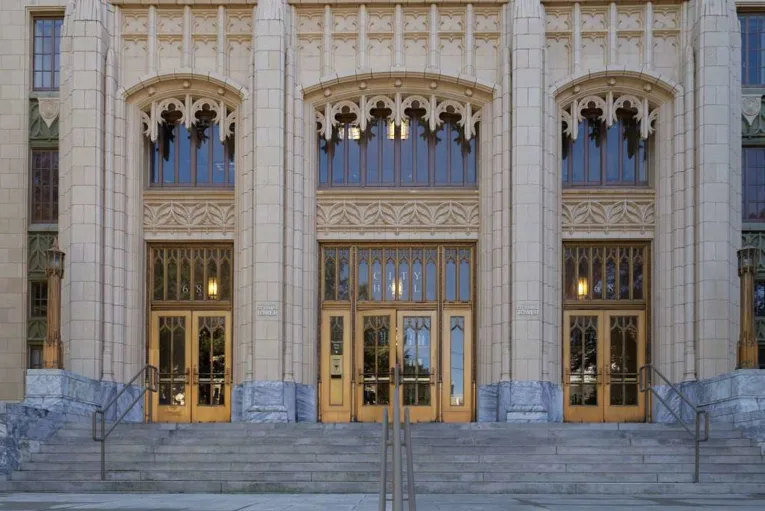After Secret Replacement Process Ends, Atlanta Diversion Program’s Future Is Still Unclear
Advocates say Atlanta mayor is trying to sabotage the city’s contract with a diversion services provider—and the City Council is letting him.

Update, Nov. 18, 2024: At Monday’s City Council meeting, council members voted 11 to 2 to approve PAD’s contract. It will now go to the mayor’s desk for his approval.
Civil rights groups are demanding that Atlanta City Council members vote at today’s meeting on a contract for pre-arrest diversion services that has been stalled for months.
For months, the council has refused to vote on the contract with the Policing Alternatives & Diversion Initiative, known as PAD. Since 2017, the group has helped keep the city’s most vulnerable residents—those living in extreme poverty and those in the midst of a mental health or substance use crisis—out of jail.
Earlier this year, PAD seemed to receive the greenlight that the city would continue contracting the group’s services, but then-Mayor Andre Dickens’ office initiated a secret bidding process for community responders. The city requested the new process be canceled on Nov. 13, but PAD still lacks clarity on whether their contract will be approved, and it’s not listed on the public agenda for today’s council meeting. Typically, legislation is approved in a committee before it is sent to the full council.
Advocates speculate that the mayor is retaliating against PAD over its opposition to the city’s plan in 2022 to lease jail beds to Fulton County.
“Because PAD held strong to their principles of diverting people, and wanting to divert people, and not to rely on carceral responses, I think that is the tipping point for the mayor’s treatment of PAD,” Devin Franklin, an attorney with the Southern Center for Human Rights, told The Appeal. “We’re dealing with vengeance from a very personal and petty place.”
Earlier this year, after an open bidding process, Atlanta’s chief procurement officer notified PAD in July they had been “recommended as the top ranked supplier.” The group’s director told The Appeal they negotiated a contract with the city, which would be voted on by the council before it was sent to the mayor’s desk.

Last month, Dickens’s office initiated an invite-only 14-day special procurement process for services that PAD was supposed to provide under their proposal. The group’s director told The Appeal they were not invited to participate. Then in a memo dated Nov. 13, the chief procurement officer announced they had received zero proposals and the executive offices had requested cancellation of the special procurement. The Appeal received the memo on Friday in response to a public records request and was the first to break the news.
But Councilmember Amir Farokhi told The Appeal in an email that this doesn’t necessarily clear the way for the council’s vote on PAD. Farokhi, who sponsored the legislation authorizing PAD’s contract, said the council is “waiting on clear intention from the mayor’s office as to whether they plan to launch a new [request for proposals] or prefer to move forward with the results of the one conducted earlier this year (to which PAD was the only respondent). Either way, there will be no gap in service.”
Advocates say the council has the authority and duty to take action on PAD’s contract. In addition to the Southern Center for Human Rights and Color of Change, the Legal Defense Fund and the ACLU of Georgia, along with numerous community members, have urged the council to approve PAD’s contract.
“It’s frightening that council people do not understand their role as a check and balance on the authority of the mayor,” Franklin told The Appeal. “The authority of the mayor is not supposed to be absolute. The council people sound more like interns working for the mayor, as opposed to representatives representing the wants and needs of their communities.”
Councilmember Farokhi alleged in his email to The Appeal that PAD’s funding is the responsibility of Fulton County, not the city of Atlanta, stating that “human and social services are the exclusive responsibility of the County.”
PAD’s director, Moki Macías, told The Appeal in an email that the group’s work is well within the city’s purview. PAD works with the Atlanta Police Department, which is under the jurisdiction of the City Council’s Public Safety & Legal Administration Committee, to keep community members out of jail and connect them with services like mental health or substance use treatment, housing, and food. The group responds to 311 and 911 calls, as well as requests for help from the Atlanta Police Department, MARTA, Georgia State, and Georgia Tech police officers.
“PAD provides public safety services that reduce the burden on traditional first responders and facilitate connections to social services,” Macías said. “At scale, this service directly reduces the need for police response which is a city function.”
The Fulton County Sheriff’s Office told The Appeal in an email that as of today, more than 1,100 people who were arrested by the Atlanta Police Department are being detained by the Sheriff’s office. Of those, just over 800 are held in the Fulton County Jail. Last week, the U.S. Department of Justice announced that its civil rights investigation into the jail revealed that the jail routinely violates detainees’ constitutional rights. They found that detainees live in filthy, vermin-infested conditions and that violence, starvation, and extortion schemes are pervasive.
